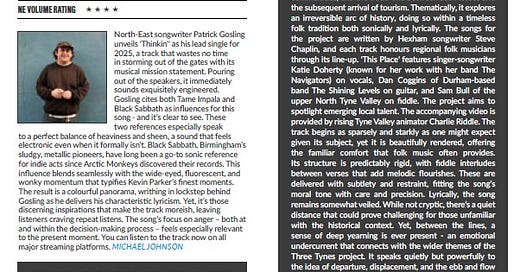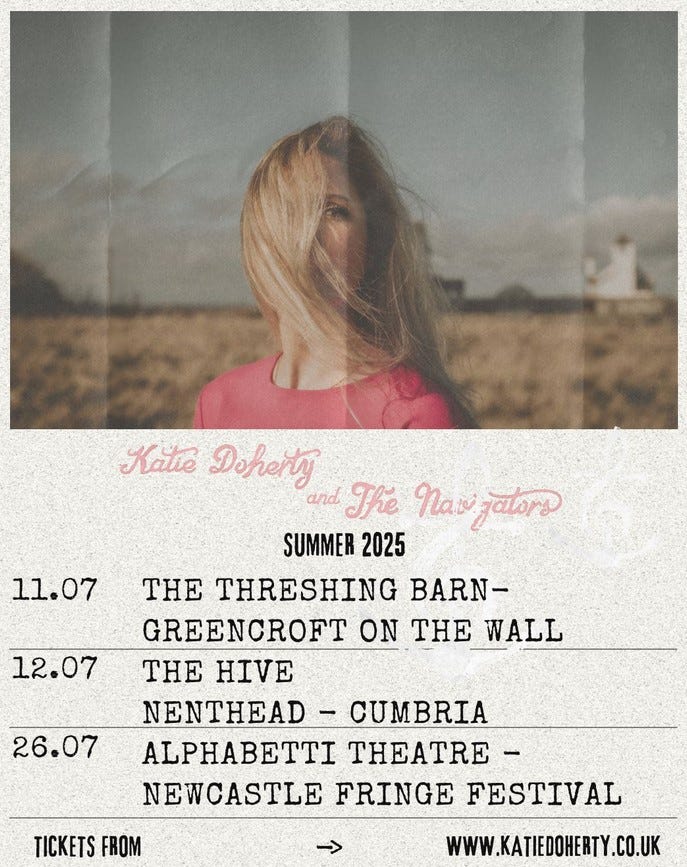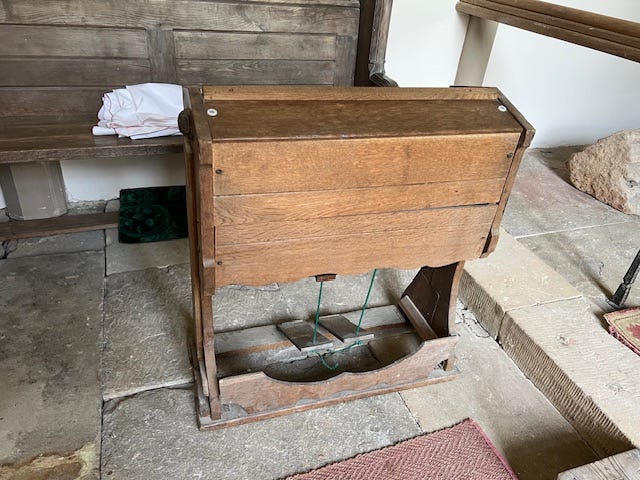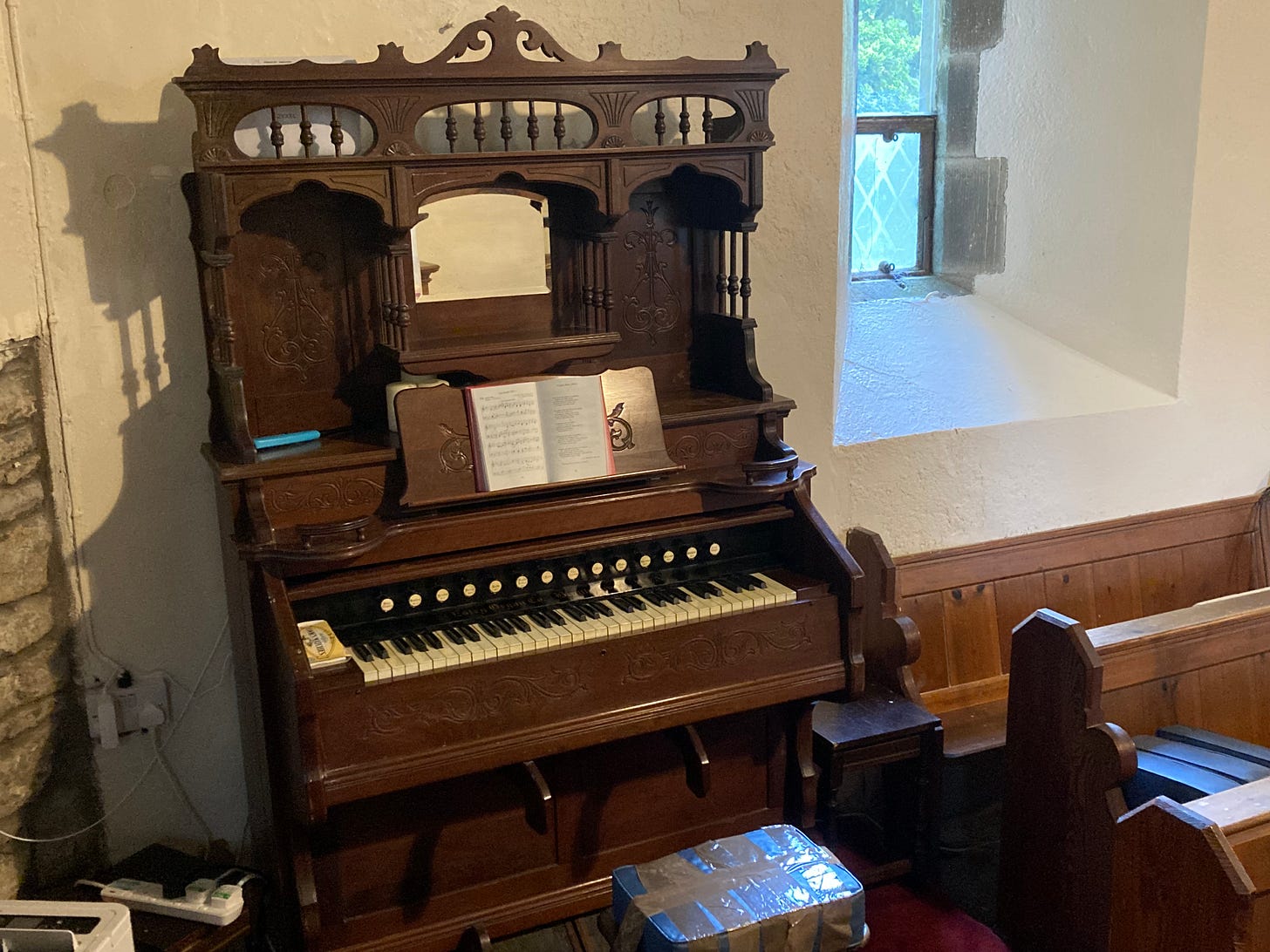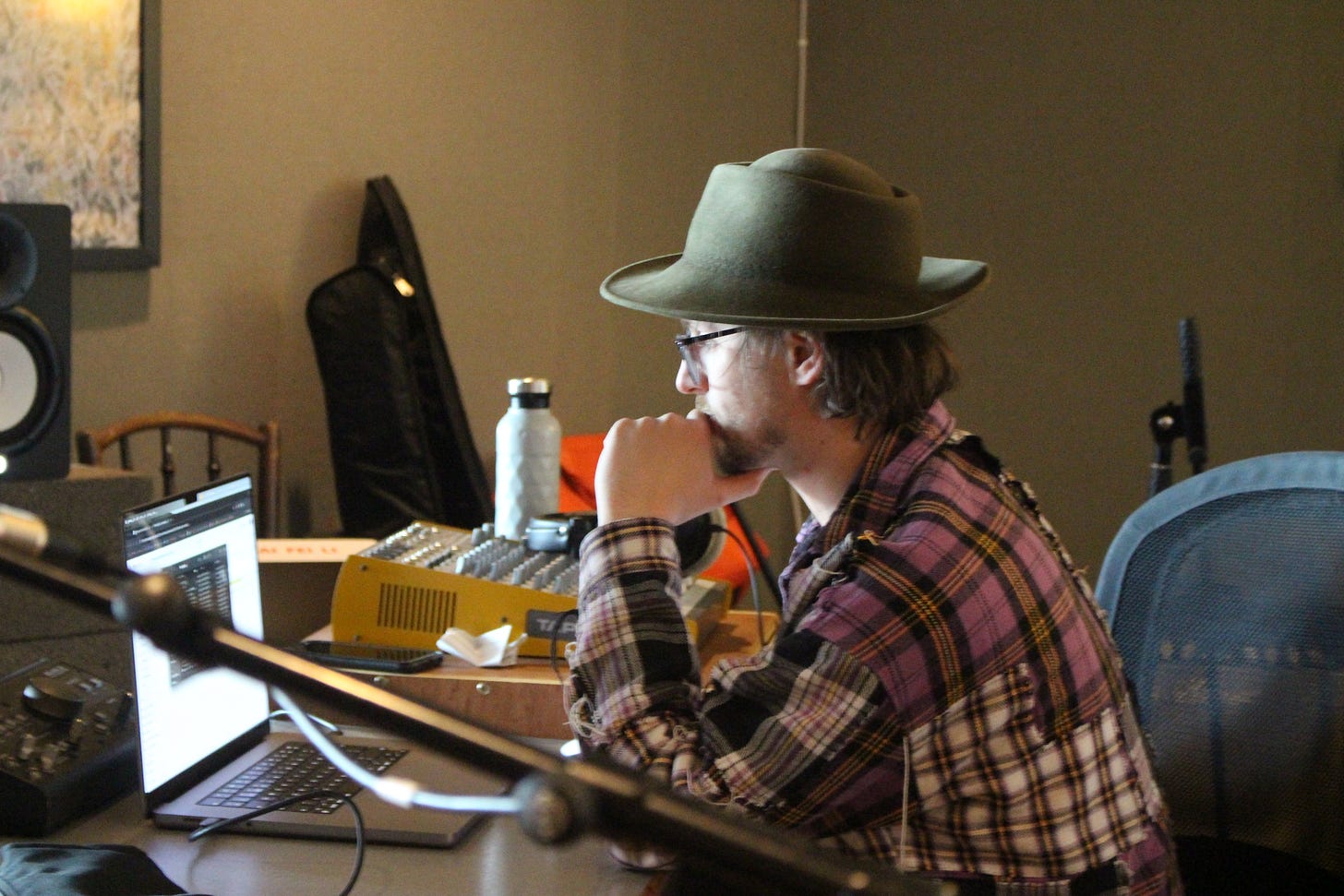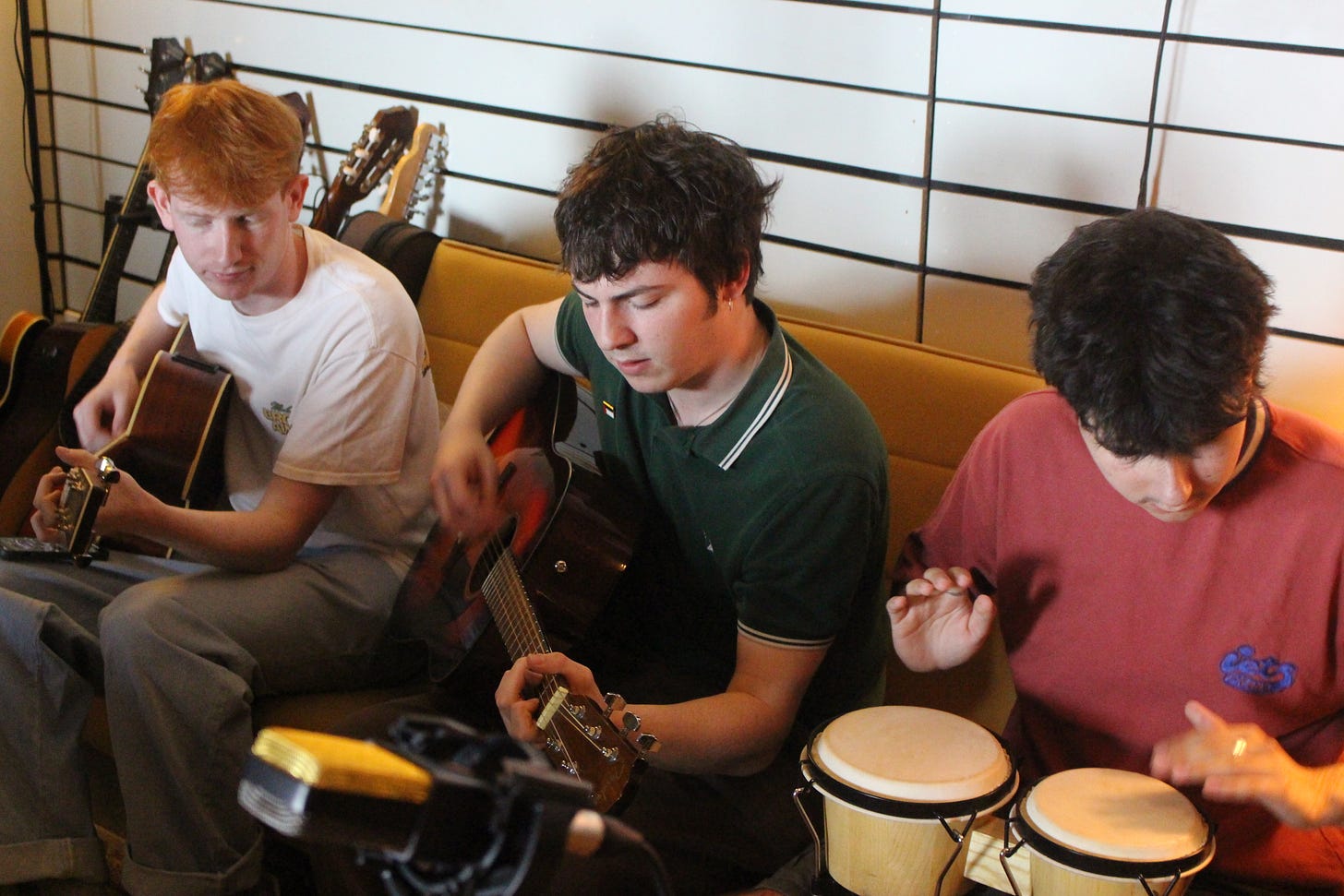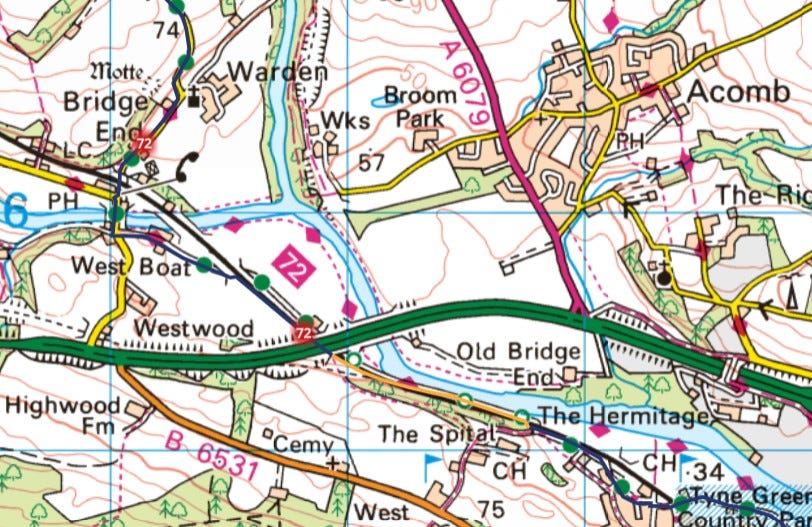I was taking a break on the long end-of-holiday drive down the A9 in Scotland when I unexpectedly got an email from Lee Alcock, the editor of NE Volume Magazine, telling me there was a review of This Place in the June issue. And what a kind - indeed, learned - review it was! I am more than proud to post it here:
We have had some very encouraging feedback about the song and Charlie Riddle’s animation. It helps us to keep going when progress is slow - it’s like when you’re walking up a steep hill in the Lakes and you get to what you thought was the top only to see another horizon looming in the distance and, at that moment, you discover a small piece of chocolate in your pocket.
And I am delighted to say that we now have three opportunities to see Katie Doherty play live with her band the Navigators (Dave Gray on melodeon and Grace Smith on fiddle). I’ll be at the Nenthead one.
Buoyed by the reception for the episodes on the ukulele and the carillon, I had hoped to record an episode featuring the harmonium in St John’s Church in Whitfield. I’m fascinated by this humble instrument and how it has come to be an important source of music for small communities but the winds did not blow fair.
St John’s is Whitfield’s former church, now replaced by Holy Trinity Church, which we visited for the episode on the carillon. It’s not clear when it was first built but its presence was recorded as early as 1550 and it was rebuilt in 1782. The harmonium, which occupies a modest box (pictured below) is rarely used and inspection revealed it’s in a poor state, with a couple of uncooperative keys.
Photo courtesy of Sarah Blackett-Ord
All was not lost: Sarah Blackett-Ord, the Church Warden at Whitfield, told me that there is a harmonium at St Mark’s Church in Ninebanks and that it is regularly played.
I’d never visited St Mark’s, though I’ve been past it many times. Built in 1871, it’s Grade II listed. I was shown around by Dorothy Summers, the Church Warden, and met Ros Ronaldson, who plays the harmonium for services and demonstrated its tones with a quick hymn. I’d called in with my wife on a cold, damp bike ride and we were given the warmest of welcomes and treated to tea and delicious cakes by the ladies of Ninebanks. They were lovely - the ladies mostly, but also the cakes - and there is no other word to describe them. I am now doing my homework on harmoniums; the episode will most likely be recorded in the autumn.
Next up, I spoke to Connal, Joe and Ben of the Hexham band Central Arcade, for an episode recorded and produced by Dean Parker in the Odobo Studio in the John Marley Centre in Scotswood.
I mention the venue because (a) I haven’t got the capacity to interview more than one person at a time and (b) it meant I got a quality recording. And Dean, a former podcast guest (11th June 2024), is a great musician and producer and it’s good news that he now has his own studio. We had a long and fascinating conversation about life in an up and coming band - and Central Arcade are certainly that, with an enviable track record of gigs and an EP released on June 27th.
Three Tynes
There is some almost news about Three Tynes. It is to become a company limited by guarantee - a form of not-for-profit community interest company that will provide the existence in law that almost all funders require as a condition of eligibility for grants. This will greatly expand the pool of the project’s potential supporters while preserving its charitable purpose. The paperwork will be completed over the next couple of months, when I’ll make a formal announcement.
Meanwhile, back to the music… With the seventh song, What A Pair We Make, we have arrived at Watersmeet, the confluence of the North and South Tynes, a peaceful place and a popular spot for walkers. The east bank is a Site of Special Scientific Interest; the southern bank is a prime spot for birdwatching in the Spring.
The rivers at Watersmeet are usually calm and slow, having done their fair share of tumbling over boulders in their later stretches. It’s a fitting place for our two characters, having journeyed far from home both literally and emotionally, to find one another. What A Pair We Make is one of my favourite songs in Three Tynes, not least because it’s a bit odd - half-spoken, unusually structured but with a melodic chorus. It tells of people who have been round the block a few times and who are attracted to each other, all the time aware of the tentative nature of their exchanges, of the barriers they have to overcome and the risks they need to take, if they are to come together. The song is about wanting in the midst of uncertainty; it’s gentle and optimistic.
The intro is not unlike a church organ announcing, as if by premonition, the arrival of the happy couple but this is soon replaced by softly energetic guitar chords and a spoken verse. It feels angular and awkward, and no sooner is the first verse and chorus complete than we’ve rushed into a bright instrumental section, reflecting unexpected delight as the waters from the two rivers mingle. The song stumbles over itself to get to the next bit, pauses for thought while the two lovers acknowledge their feelings, then jumps into the more openly positive second verse. I imagine them simply looking at each other and grinning. And so the two rivers continue their journey eastward as one.
What A Pair We Make is currently only in the original demo form. I’m looking forward to creating something special in the studio but I hope I can capture the innocence of this recording. It’s a happy song and goodness knows we need more of those these days, especially as the next one, If I Can Ever Sleep, is a song about fear of the past.

